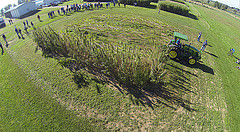Dallas, Texas (PRWEB) July 15, 2014
Many people are adopting a vegan diet as a result of their ethical concerns about animal rights, protecting the environment, and saving the planet. Nowadays, veganism has become a lifestyle choice and a more widely known philosophy. The vegan diet does not include anything of animal origin. According to PETA, about 2.5 percent of the US population is vegan. In addition, people perceive a vegan diet to be healthy and prefer consuming dairy alternatives such as soy milk, almond milk, rice milk, coconut milk, hazelnut milk, oat milk, and hemp milk as a substitute for dairy milk. Analysts forecast the Global Dairy Alternative Beverages market will grow at a CAGR of 15.74 percent over the period 2013-2018. According to the report, several factors drive the growth of the Global Dairy Alternative Beverages market. The increased health benefit is one of the major drivers in the market.
The Global Dairy Alternative Beverages market can be segmented into four divisions: Soya Milk, Almond Milk, Rice Milk, and Others. These are the major substitutes for milk, which are widely consumed by the consumers worldwide.
Global Dairy Alternative Beverages Market 2014-2018, has been prepared based on an in-depth market analysis with inputs from industry experts. The report covers the Americas, and the EMEA and APAC regions; it also covers the Global Dairy Alternative Beverages market landscape and its growth prospects in the coming years. The report also includes a discussion of the key vendors operating in this market.
The report recognizes the following companies as the key players in the Global Dairy Alternative Beverages Market: Organic Valley Family of Farms, Sanitarium Health & Wellbeing Co., The Hain Celestial Group Inc., The WhiteWave Foods Co., Blue Diamond Growers Inc., Earth’s Own FoodCompanyInc., Eden Foods Inc., Freedom Foods Group Ltd, Living Harvest Foods Inc., Nutriops S.L., OATLY AB, Pacific Natural Foods, Panos Brands LLC, Pureharvest Foods, Stremicks Heritage Foods, SunOpta Inc., Turtle Mountain LLC, Vitasoy International Holdings Ltd.
Purchase report at http://www.sandlerresearch.org/purchase?rname=19359.
Key Regions
Americas
APAC
Europe
ROW
Key Market Driver
Increasing Demand for the Dairy Alternative Beverages due to its Health Benefits.
Key Market Challenge
Threat of Cross-contamination.
Key Market Trend
Rising Concern for the Vegan Diet.
Further, the report states that despite the presence of several drivers, the growth of the market is curtailed by certain challenges. The threat of cross-contamination of raw materials is a major challenge that limits the growth of the market.
Key Questions Answered in this Report
What will the market size be in 2018 and what will the growth rate be?
What are the key market trends?
What is driving this market?
What are the challenges to market growth?
Who are the key vendors in this market space?
What are the market opportunities and threats faced by the key vendors?
What are the strengths and weaknesses of the key vendors?
Table of Contents
01. Executive Summary
02. List of Abbreviations
03. Scope of the Report
03.1 Market Overview
03.2 Product Offerings
04. Market Research Methodology
04.1 Market Research Process
04.2 Research Methodology
05. Introduction
06. Market Landscape
06.1 Market Overview
06.2 Market Size and Forecast
06.3 Five Forces Analysis
07. Market Segmentation by Product
07.1 Global Dairy Alternative Beverages Market by Product Types 2013
07.1.1 Overview of the Global Health and Wellness Market by Product Type 2013-2018
08. Geographical Segmentation
08.1 Global Dairy Alternative Beverages Market by Geographical Segmentation 2013-2018
08.2 Overview of Global Dairy Alternative Beverages Market by Geography
08.3 Dairy Alternative Beverages Market in the APAC Region
08.3.1 Market Size and Forecast
08.4 Dairy Alternative Beverages in the Americas
08.4.1 Market Size and Forecast
08.5 Dairy Alternative Beverages Market in Europe
08.5.1 Market Size and Forecast
08.6 Dairy Alternative Beverages Market in the ROW
08.6.1 Market Size and Forecast
09. Key Leading Countries
09.1 China
09.2 USA
10. Buying Criteria
11. Market Growth Drivers
12. Drivers and their Impact
13. Market Challenges
14. Impact of Drivers and Challenges
15. Market Trends
16. Trends and their Impact
17. Vendor Landscape
17.1 Competitive Scenario
17.1.1 Key News
17.1.2 Mergers and Acquisitions
17.2 Market Analysis 2013
17.3 Other Prominent Vendors
18. Key Vendor Analysis
19. Other Reports in this Series
18 – List of Exhibits
Browse other new reports on Food and Beverage Market, Hot Drinks Market.
About US:
Sandlerresearch.org (http://www.sandlerresearch.org/) is an online market research store for research reports on multiple industries. These reports provide market analysis, trends and opportunities and forecast about industries that helps to make a right decision for the business.
Related Hemp Farming Press Releases


